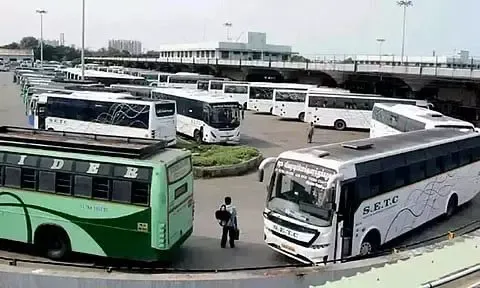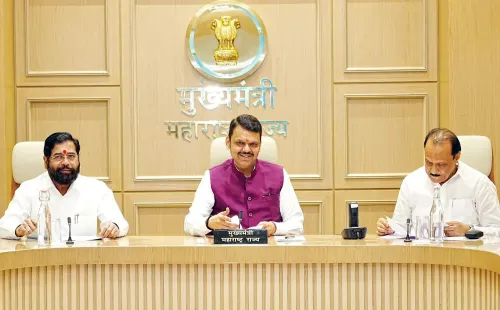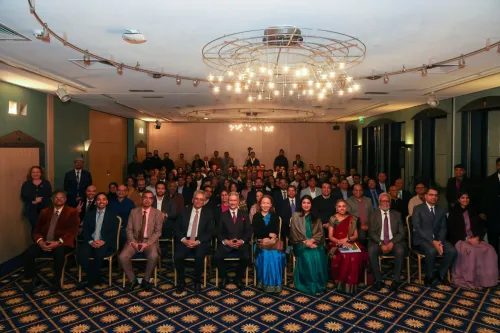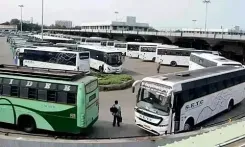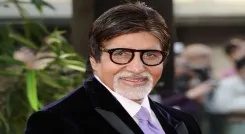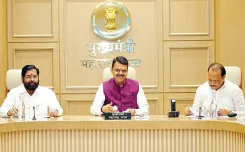Is Nehru Your Grandfather? I Have the Right to Question: Nishikant Dubey Challenges the Gandhis

Synopsis
Key Takeaways
- Nehru's actions are open to public scrutiny.
- Dynastic politics have long-term implications.
- Article 370's application raises questions.
- Historical accountability is crucial.
- The military must be respected by political leaders.
New Delhi, July 29 (NationPress) BJP Lok Sabha MP Nishikant Dubey has taken a strong stance against Leader of Opposition Rahul Gandhi and Congress MP Priyanka Gandhi, asserting that they behave as if they possess exclusive rights over former Prime Minister Jawaharlal Nehru.
During the Operation Sindoor debate in the Lok Sabha, Dubey emphasized that Nehru's actions as India's first Prime Minister are subject to public examination.
"I want to express my gratitude to the Indian armed forces for responding decisively to Pakistan following the Pahalgam terror incident. I pay my respects to those innocent lives lost due to religious extremism," Dubey stated as he commenced his speech.
In response to Priyanka Gandhi's call for people to move on from the past, Dubey remarked, "A person, society, or community that neglects its history is doomed to destruction. We must learn from our past while living in the present. The key issues discussed in Parliament are Kashmir and China."
He accused Rahul and Priyanka Gandhi of behaving as if they have a "seal" from Jawaharlal Nehru.
"Nehru may be your grandfather, but he was the inaugural Prime Minister of India, and I am entitled to question his actions. You can’t claim an exclusive connection to him. I have the right to address the consequences I am facing," he added.
Dubey referenced Nehru's book, 'Glimpses of World History', where Mahmud Ghazni was labeled a "warrior," suggesting that this perspective is indicative of a mindset that the Congress party still embodies.
Regarding the Partition, Dubey held Mohammad Ali Jinnah and Liaquat Ali accountable, but also pointed out that dynastic politics within Congress has caused long-term damage. He noted that Nehru's appointment of his sister, Vijay Laxmi Pandit, as ambassador to Moscow deeply irked Liaquat Ali, leading him to relocate to Pakistan after Partition.
"This same dynastic politics has brought both the Congress party and the nation to its current predicament," he stated.
Dubey elaborated on Kashmir's integration into India, stating, "In 1942, while India launched the 'Bharat Chhodo Andolan', Sheikh Abdullah was leading the 'Raja Chhodo Andolan' in Kashmir. Jinnah backed the King instead of Sheikh Abdullah, leading the King to believe that Nehru was not supporting him, which delayed his decision to join India."
He questioned the special status of Kashmir under Article 370.
"The King signed the same Instrument of Accession as the other 600 princely states. When similar measures were enacted in Manipur, Kutch, and Uttar Pradesh, why was Article 370 uniquely applied to Kashmir?" Dubey asked.
"If the Nehru-Gandhi family is accountable for the present situation in Kashmir, then we will hold them to account. Why do Priyanka Gandhi and Rahul Gandhi object to this?" he questioned.
Dubey also made a contentious claim regarding a CIA report, alleging that around 40 percent of Congress MPs were "financed" by the Soviet Union and functioned as "agents" of Russia.
He further criticized Nehru for the Chinese occupation of Tibet, asserting that it has contributed to China's increasing hostility along India's borders.
Mentioning Field Marshal Sam Manekshaw, Dubey contended that the 1971 war hero was denied his pension from 1972 until 2007. "It was only when Abdul Kalam became President and intervened that Gen Mankeshaw received his pension in 2008," Dubey remarked.
"You fail to respect the Army Chief, the 1971 war hero, yet you claim to honor the armed forces," he concluded.


